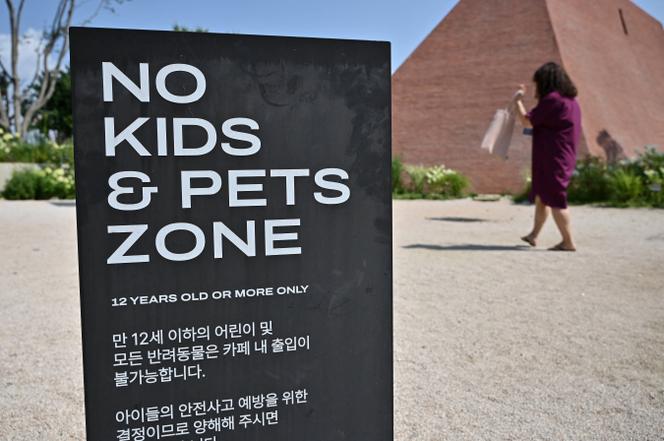

LETTER FROM SEOUL

It is no coincidence that South Korean society has been suffering from a low birth rate, as it seems to find the mere presence of children exhausting. As proof, one need only consider the large number of establishments that refuse entry to the youngest customers. "At first, we had baby seats, but there were too many problems. The little ones would scream, throw food, and, or, refuse to eat it. Their behavior could be annoying to other patrons. But our prices are quite high, therefore customers are expecting superior service," said Iyo Iyo (not her real name), an employee of a rather chic sushi restaurant in the heart of Seoul. Like hundreds of others, this establishment does not allow children. The words "no-kids zone" have even made their on way on the restaurant's menu.
This trend has been growing in South Korea, where the Jeju Research Institute has identified 542 "no-kids zones." A user-generated map on Google lists 459. This phenomenon has become a cause for concern in a country experiencing a population decline, and where no-go zones have begun affecting increasingly large sections of the population. Min-ah Lee, a sociologist at Seoul's Chung-Ang University, has seen "a growing trend towards exclusion among groups, and a growing refusal to accommodate others."
The first child-free zones date back to the early 2010s and are said to have been mainly prompted by concerns over legal liability – as incidents that occur in restaurants tend primarily to be blamed on their owners. In 2013, a court in Pusan, in the southeast of the country, ordered a restaurant owner to pay 41 million won (€28,700) to a family: A waiter had accidentally spilled boiling water on a 10-year-old child, who had collided with him while running toward a playroom that had been set up on the premises. Between 2018 and 2023, 2,943 accidents related to child safety occurred in hotels and restaurants, according to the Korea Consumer Agency. In each case, the managers were convicted.
According to a survey published in December 2023 by the Korean ministry of health, 68% of café and restaurant owners have justified their decision to refuse children by citing the "excessive burden of responsibility." This reason has been offered well ahead of others, such as the menu not being suitable for children − too spicy, for example − having a lack of space or worrying that the commotion will disturb other customers.
This has become a hotly debated issue, as South Korea has been experiencing an accelerated rate of decline in its population, with a fertility rate of 0.72 children per woman in 2023 (versus 1.68 in France, and 1.78 in America). "Children are naturally immature and learn good manners through contact with others. The 'no-kids zones reflect the culture of a society that ostracizes children and their families," said Yong Hye-in, a member of the Basic Income Party, a small progressive party.
You have 45.05% of this article left to read. The rest is for subscribers only.
